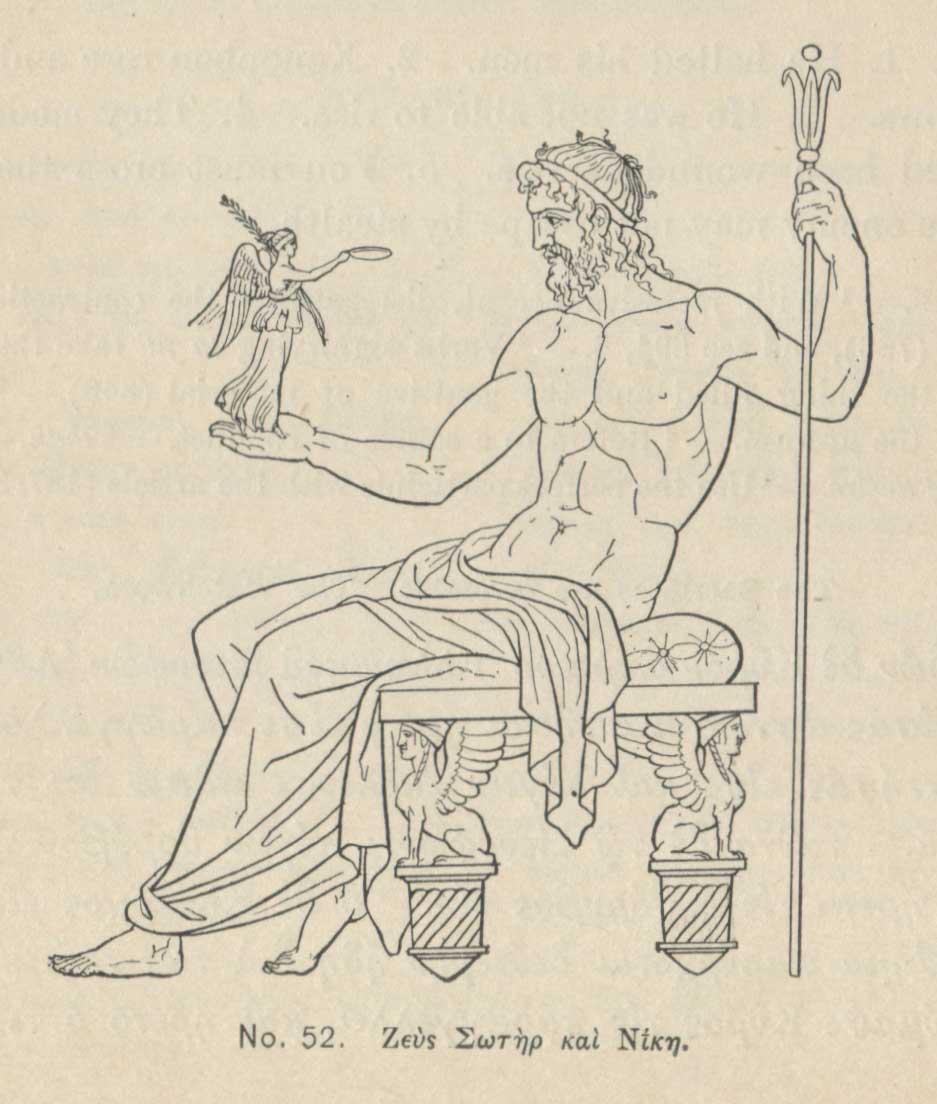THE FIRST GREEK BOOK
BY JOHN WILLIAMS WHITE, PH.D, LL.D., LITT.D.
Professor Of Ancient Greek At Harvard University
This Revision Copyright ©2012 by Shawn Irwin
Lesson LXXVI - Regular Verbs in ΜΙ, ἵστημι.
S705. Learn the conjugation of the present and second aorist systems of
ἵστημι (στα); set, make stand, in 786 and 790.
Read and note the following in explanation of the paradigms:
S706.
1. ἵστημι is for σι-στη-μι, the rough breathing representing the
σ of the reduplicating syllable.
2. In the singular of the present and imperfect indicative active, στα is lengthened to στη,
and the third person plural of the present ends in ᾱσι, ἱστᾶσι arising from ἱστα-ᾱσι by contraction.
3. In the imperfect indicative, ι is due to the augment (67, 2).
4. For the formation of the subjunctive and optative, see 694, 3 and 4, but here in the subjunctive α + η = η, not
α, and α + ῃ = ῃ, not ᾳ (340).
5. In the present imperative active, ἵστη (for ἱστα-θι) rejects
θι and lengthens the final vowel of the stem.
6. The lengthening of στα to στη occurs also in the second aorist indicative,
imperative (except in στάντων), and infinitive active.
7. The active participles ἱστάς and στάς are declined like λύσᾱς (754).
8. The second aorist middle of ἵστημι does not occur.
S707. VOCABULARY.
ἀνίστημι, make rise, rouse; mid with perfect and second aorist active, intransitive, stand up, rise.
ἀποδιδράσκω, run away, escape by stealth.
βαίνω (βα), βήσομαι, ἔβην, βέβηκα, βέβαμαι, ἐβάθην, go, walk.
διαβαίνω, go over, cross.
διδράσκω, (δρα), δράσομαι, ἔδρᾱν, δέδρᾱκα, run.
δύναμαι, (δυνα), δυνήσομαι, δεδύνημαι, ἐδυνήθην, be able or capable, be with, amount to, signify.
ἐμπίμπλημι, fill full, satisfy.
ἐπίσταμαι, (ἐπιστα), ἐπιστήσομαι, ἠπιστήθην, understand, know.
ἐφίστημι, bring to a stand, make halt; middle with perfect and second aorist active, intransitive, halt, stop.
ἵστημι, (στα), στήσω, ἔστησα and ἔστην, ἕστηκα, ἔσαμαι, ἐσάθην,
set, make stand, make halt; mid. (except first aorist), with perfect and second aorist active, intransitive, stand, stop, halt.
καθίστημι, set down or in order, settle, station, establish; middle, with perfect and second aorist active,
intransitive, take ones place.
πίμπλημι (πλα), πλήσω, ἔπλησα, πέπληκα, πέπλημαι and πέπλησμαι, ἐπλήσθην, fill.
a. Although not μι-verbs, βαίνω, διδράσκω, and
φθάνω (685) have second aorists of the μι-form.
S708.
1. οἱ δὲ πολέμιοι οὐκέτι ἔστησαν.
2. ἐὰν τι δύνωμαι ταῦτα ποιήσω.
With recessive accent, disregarding the contraction. Compare ἱστῶμαι (786), and see 694, 3.
3. τὰς διφθέρας ἐπίμπλασαν χῑλοῦ.
Verbs signifying to fill take the accusative of the thing filled and the genitive of material (848).
4. ἀνέσησαν οἱ Ἕλληνες καὶ εἶπον ὅτι ὥρᾱ τοὺς φύλακας καθιστάναι.
5. καὶ ἔφθησαν ἐπὶ τῷ ἄκρῳ γενόμενοι τοὺς ἱππέᾱς.
Second aorist of the μι-form.
6. ἀλλὰ καὶ τοῦτο γε ἐπίστασθε.
7. τοῦτο δὲ οὐδὲν ἄλλο δύναται ἠ ἀποδρᾶναι.
Refers to a course of conduct ἠ than.
8. ἐβουλεύοντο ὅπῶς ἂν κάλλιστα διαβαῖεν.
9. ἐπέστη ὁ Κῦρος σὺν τοῖς περὶ αὐτὸν ἀρίστοις.
10. ὁ δὲ ἐμπιμπλὰς ἀπάντων τὴν γνώμην ἀπέπεμπεν.
Satisfying the desire.
11. στάντων οἱ ὁπλῖται.
12, ἀλλʼ εὖ ἐπιστάσθων ὅτι οὐκ ἀποδεδράκᾱσιν.
S709.
1. He halted his men.
2. Anabasis rose and spoke as follows.
3. He was not able to rise.
4. They made those who had been wounded rise.
Use the perfect participle with the article (487, 3 and 4).
5. You must cross the river, that the enemy may not escape by stealth.
S710. The Sacrifices are favorable. The Watchword.
ἰδὼν δὲ Κῦρον ἀπὸ τοῦ ἐλληνικοῦ Ξενοφῶν Ἀθηναῖος, πελάσᾱς
ὥστε συναντῆσαι ἤρετο εἴ τι παραγγέλλοι.
ὁ δὲ ἐπιστήσας εἶπε
καὶ λέγειν ἐκέλευσε πᾶσιν ὄτι τὰ ἱερὰ καλά. ταῦτα δὲ τῷ Ξενοφῶντι
λέγων θορύβου ἤκουσε, καὶ ἤρετο τίς ὁ θόρυβος εἴη. ὁ δὲ Κλέαρχος
εἶπεν ὅτι σύνθημα παρέρχεται δεύτερον ἤδη διὰ τῶν τάξεων. καὶ
ἐθαύμασε Kῦρος τίς παραγγέλλει, καὶ ἤρετο ὅ τι εἴη τὸ σύνθημα.
ὁ δ᾽ ἀπεκρίνατο, "Zεὺς Σωτὴρ καὶ Nίκη." ὁ δὲ Kῦρος ἀκούσας,
"Ἀλλὰ δέχομαι τε, ἔφη, "καὶ τοῦτο ἔστω." ταῦτα δ᾽ εἰπὼν εἰσ τὴν
αὐτοῦ χώρᾱν ἀπήλαυνεν.
πελάσᾱs κτλ: approaching him so as to meet him. (κτλ - see § 465)
ἤρετο: the second aorist of poetic ἐρομαι, equivalent to ἐρωταω.
εἰ τι παραγγέλλοι: whether he had any commands. For the optative in the indirect question, see 569.
ἐπιστήσας: first aorist, transitive, pulling up (his horse ).
θορύβου: for the genitive following ἀκούω, see 846.
Κλέαρχος εἶπεν: he had ridden up in the meantime.
τίς παραγγέλλει: who was giving it out, without his approval.

See the route on the map.
End Of Chapter
INDEX
Chapter 77
HOME
This Revision Copyright ©2012 by Shawn Irwin
